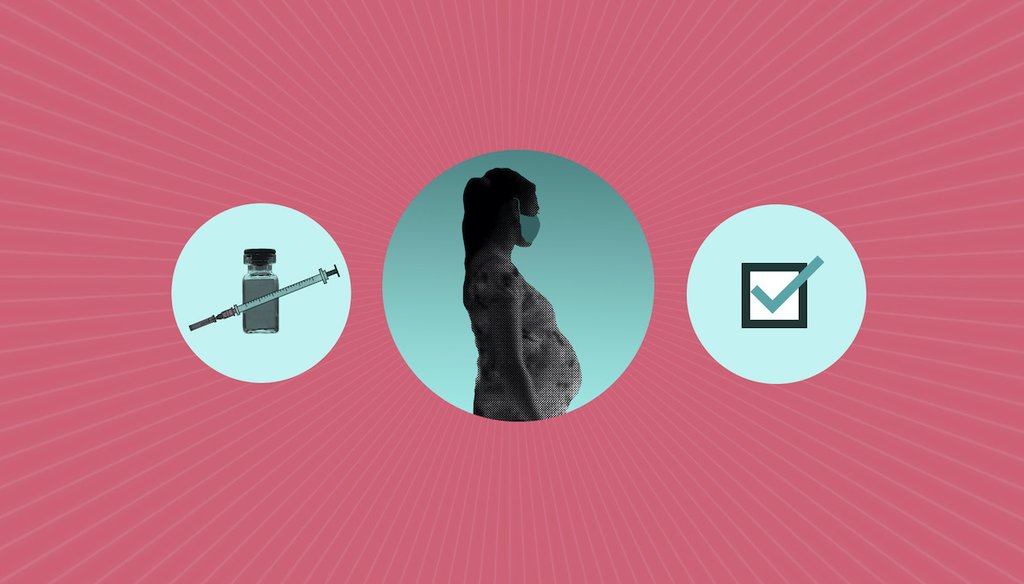Stand up for the facts!
Our only agenda is to publish the truth so you can be an informed participant in democracy.
We need your help.
I would like to contribute

It could be months before there’s more conclusive data about vaccine safety for pregnant women, but researchers say they've made a good start. (AP)
If Your Time is short
-
There’s strong evidence that pregnancy heightens the risk for severe COVID-19, and that pregnant women have a greater need for protection than other healthy adults.
-
The vaccines authorized in the U.S. haven’t been tested specifically for their effects on pregnant women. Scientists say the vaccines are likely safe, but they don’t yet know for sure. As a result, health experts are giving conflicting recommendations.
-
Observational data on pregnant people who have gotten vaccinated looks reassuring so far.
As eligibility for the coronavirus vaccines widens across the United States, more pregnant women are faced with the decision of whether to get vaccinated.
Alarming social media posts warn that pregnant women who were vaccinated have experienced miscarriages or could face infertility — anecdotal stories that can heighten anxiety for expectant parents in a climate already rife with misinformation.
PolitiFact took a closer look and found two important issues for pregnant women to consider.
-
There’s strong evidence that pregnancy heightens the risk for severe COVID-19, and that pregnant women have a greater need for protection than other healthy adults.
-
The vaccines authorized in the U.S. haven’t been tested specifically for their effects on pregnant women. Scientists say the vaccines are likely safe, but they don’t yet know for sure.
What they do know so far is based largely on monitoring of vaccinated pregnant women, and appears to affirm the vaccines’ safety. Dr. Anthony Fauci, head of infectious diseases at the National Institutes of Health, said in a recent briefing that researchers have seen "no red flags" so far from the 20,000 pregnant women participating in a federal tracking effort.
But there’s still much we don’t know. And experts aren’t in complete alignment over how to balance the potential risks of the vaccine for pregnant women against the known risks of COVID-19.
Recommendations for pregnant women
The two mRNA COVID-19 vaccines authorized for the U.S. should be offered to pregnant and breastfeeding women who are eligible for vaccination, according to the Centers for Disease Control and Prevention and several reproductive-health organizations, including the American College of Obstetricians and Gynecologists and the Society for Maternal-Fetal Medicine. The guidance is based on theoretical risks posed by the vaccines compared with the known risks that COVID-19 can pose to pregnant people.
All these groups recommend that pregnant women, or those who plan to become pregnant, should talk to their doctors to weigh the risks and benefits.
Others are sounding a more cautious note.
The World Health Organization recommends against using either mRNA vaccine in pregnant women unless the benefit to the person outweighs potential vaccine risks. It advises women to speak with their doctors to figure that out.
Similarly, the United Kingdom says that until more information is available, pregnant women shouldn’t routinely receive the mRNA vaccines. Officials there highlighted the benefits of vaccination for pregnant women who are at high risk of getting infected — women working in hospitals for example — or those with health conditions that put them at risk of serious complications. It, too, recommends that women consult their doctors first.
Why is there conflicting advice? Because clinical trials for the new COVID-19 vaccines didn’t include pregnant women, and there’s not enough conclusive data available for scientists to say for sure that the shots are safe for them.
Dr. Abbe Kordik, assistant professor of OB-GYN at the University of Chicago Medical Center, said data is thin because the vaccines are so new. "But based on how it works, I haven't seen any evidence that shows that there would be an increased risk to a pregnant person or fetus," she said.
Pregnant women who choose to wait can take other steps to limit their risk, such as "consistent mask-wearing, hand-washing and limiting activities," said Dr. Shruthi Mahalingaiah, an assistant professor of environmental, reproductive and women’s health at the Harvard T.H. Chan School of Public Health.
Pregnant women are at risk for severe COVID-19 disease
The CDC has designated pregnant people as a group with increased risk of contracting severe COVID-19.
COVID-19 patients who are pregnant are estimated to be five times more likely to need intensive care or a ventilator than those who aren’t. Pregnant women are more likely to die of COVID-19 than non-pregnant women with the disease who are the same age. For those with comorbidities the risk is even greater.
Severe COVID-19, in turn, heightens other pregnancy risks, such as preterm birth, cesarean delivery, hypertensive disorders and postpartum hemorrhage, according to recent NIH data.
In one study published in JAMA Internal Medicine in January, researchers evaluated over 406,000 women who gave birth between April and November 2020 and found that those with COVID-19 had a significantly higher rate of major complications, including preterm birth, preeclampsia, thrombotic events and death.
Pregnant women and vaccines
It’s not unusual for pregnant women to be excluded from early clinical trials of vaccines, experts say, as researchers have to consider potential risks for both mother and fetus.
Shots containing live viruses aren’t recommended for pregnant women, but others using inactive organisms are, like the influenza vaccine and Tdap, which protects newborns against tetanus, diphtheria and pertussis (whooping cough).
Pfizer and Moderna’s vaccines don’t contain the live virus. They use a fragment of genetic material, called messenger RNA, that instructs cells to build the "spike" protein found on the virus surface that the immune system learns to fight off. The vaccines cannot cause infection.
Vaccine candidates from Johnson & Johnson and AstraZeneca use double-stranded DNA instead, and come out of decades of research on adenovirus-based vaccines.
"The reason there might be any leaning toward these vaccines is simply because we’ve had experience with adenoviral vaccines before with Ebola," said Dr. Geeta Swamy, associate vice president for research at Duke University and a member of expert teams on COVID-19 and immunization with the American College of Obstetricians and Gynecologists.
"But there is no scientific reason to expect that the mRNA-based vaccines would have a higher risk of harm" for the woman or the fetus, Swamy added.
Meanwhile, there is promising evidence that the protective antibodies triggered by the vaccine cross the placenta, which means the baby receives some protection against the virus.
Misinformation about the vaccines and pregnancy
Anecdotal accounts of adverse events following vaccinations commonly spread online as evidence that the shots aren’t safe. But experts warn against making assumptions about any one event without knowing the person’s medical history.
One notable case involved a Wisconsin health care worker, who shared on social media that she received her vaccination at 14 weeks of pregnancy. A few days later, she announced that she had miscarried. Within hours, screenshots of her posts spread online, with people warning without evidence that this was a result of the vaccination.
Experts caution against drawing such conclusions from individual reports. Without further study, they say, there’s no way to determine whether a given adverse event was linked to the vaccine.
Around 20% to 30% of all conceptions end in miscarriage, Swamy said, with the rate increasing with the mother’s age. Anyone who has experienced miscarriage after vaccination "should seek out medical care to get evaluated on the causes and not try to assume any one event or exposure was causal," she said.
Other misinformation included false claims that said the mRNA vaccines will cause infertility in women. Experts rejected the scientific reasoning behind those claims.
Studies and observational data
Several vaccine makers have conducted toxicity studies in pregnant animals. None have suggested any safety concerns, but the results don’t necessarily apply directly to humans.
Other studies are in the works, and observational data on pregnant people who have gotten vaccinated looks reassuring so far.
A large clinical trial will evaluate and track vaccinated pregnant women and their babies over 21 months. And an upcoming clinical research trial hopes to enroll 4,000 pregnant participants who received the Pfizer vaccine.
Moderna also created a registry to track pregnant vaccine recipients, and the CDC and FDA are monitoring pregnant people who sign up for its tracking app, V-Safe, after vaccination.
It could be several months before there’s more conclusive information. Still, researchers say the studies are a good starting point, especially combined with the safety data in other trials and observational data from the vaccine rollout so far.
Our Sources
PolitiFact, No, Pfizer’s head of research didn’t say the COVID-19 vaccine will make women infertile, Dec. 10, 2020
Wall Street Journal, WHO Recommends Against Moderna, Pfizer Vaccines for Most Pregnant Women, Jan. 27, 2021
Gov.uk, COVID-19 vaccination: a guide for women of childbearing age, pregnant or breastfeeding, Jan. 28, 2021
The American College of Obstetricians and Gynecologists, Vaccinating Pregnant and Lactating Patients Against COVID-19, Updated Feb. 4, 2021
American Society for Reproductive Medicine, PATIENT MANAGEMENT AND CLINICAL RECOMMENDATIONS DURING THE CORONAVIRUS (COVID-19) PANDEMIC, Jan. 18, 2021
Centers for Disease Control and Prevention, Guidelines for Vaccinating Pregnant Women, Accessed Feb. 11, 2021
Vox, Covid-19 vaccines are likely safe during pregnancy. When will we know for sure?, Feb. 3, 2021
Boston Medical Center, Vaccine Info for Pregnant Woman, Updated Dec. 14, 2020
UChicagoMedicine.org The mRNA COVID-19 vaccine and pregnancy: What you need to know if you're pregnant, trying to get pregnant, or breastfeeding, Feb. 4, 2021
National Institutes of Health, Severe COVID-19 in pregnancy associated with preterm birth, other complications, Jan. 28, 2021
JAMA Internal Medicine, Clinical Characteristics and Outcomes of Hospitalized Women Giving Birth With and Without COVID-19, Jan. 15, 2021
New York Times, The False Rumors About Vaccines That Are Scaring Women, Jan. 26, 2021
Harvard Medical School, Wondering about COVID-19 vaccines if you’re pregnant or breastfeeding?, Jan. 28, 2021
ClinicalTrials.gov, COVID-19 Vaccines International Pregnancy Exposure Registry (C-VIPER), Accessed Feb. 16, 2021
COVID-19 response team briefing, Feb. 10, 2021
The New Yorker, The Coronavirus Vaccine Presents a Dilemma for Pregnant Women, Feb. 1, 2021
Phone interview, Dr. Shruthi Mahalingaiah assistant professor of environmental, reproductive, and women’s health at the Harvard T.H. Chan School of Public Health, Feb. 12, 2021
Phone interview, Dr. Abbe Kordik assistant professor of obstetrics and gynecology at the University of Chicago Medical Center, Feb. 15, 2021
Phone interview, Julia W. Wu, principal investigator at the Human Immunomics Initiative at Harvard T.H. Chan School of Public Health
Phone interview, Dr. Geeta Swamy associate vice president for research at Duke University, Feb. 16, 2021






































